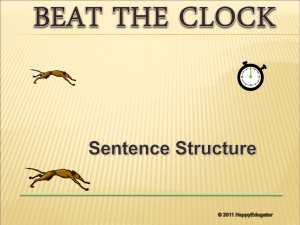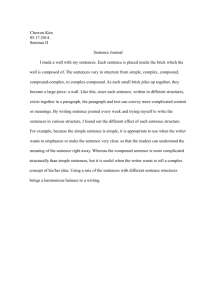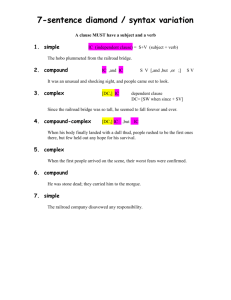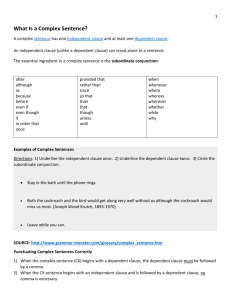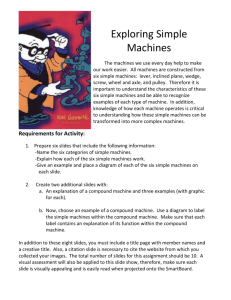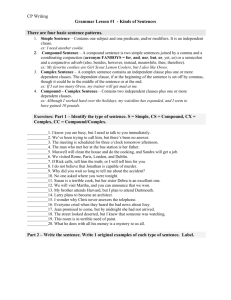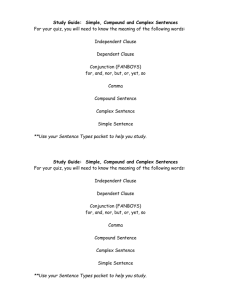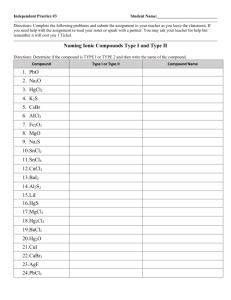Understanding Sentence Structure
advertisement
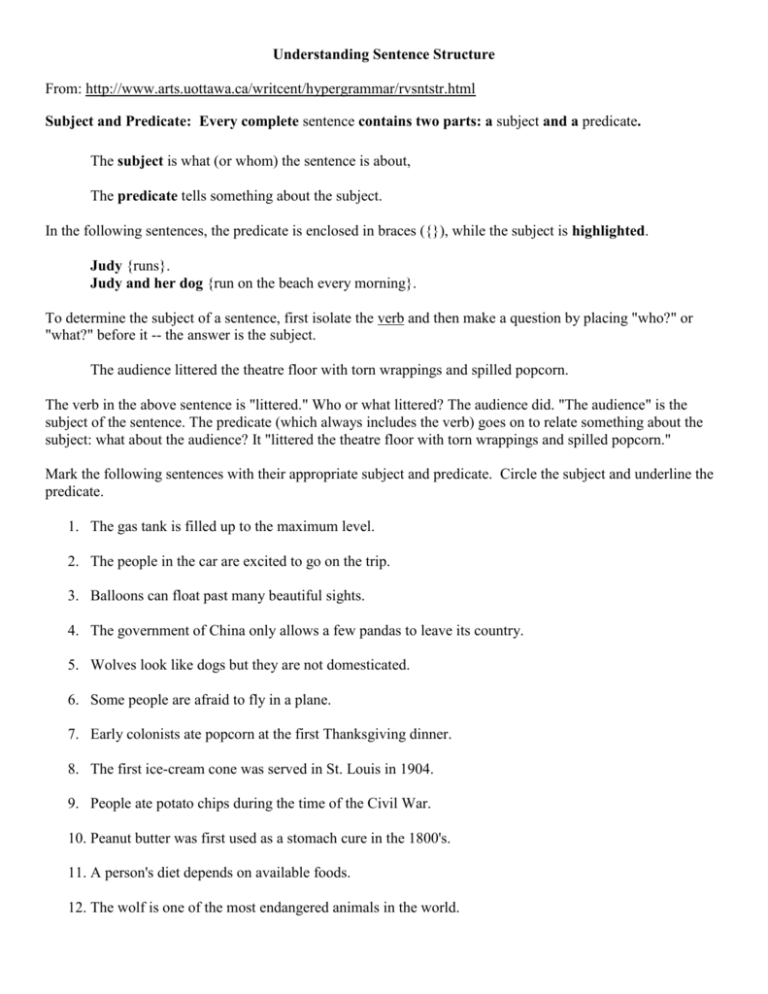
Understanding Sentence Structure
From: http://www.arts.uottawa.ca/writcent/hypergrammar/rvsntstr.html
Subject and Predicate: Every complete sentence contains two parts: a subject and a predicate.
The subject is what (or whom) the sentence is about,
The predicate tells something about the subject.
In the following sentences, the predicate is enclosed in braces ({}), while the subject is highlighted.
Judy {runs}.
Judy and her dog {run on the beach every morning}.
To determine the subject of a sentence, first isolate the verb and then make a question by placing "who?" or
"what?" before it -- the answer is the subject.
The audience littered the theatre floor with torn wrappings and spilled popcorn.
The verb in the above sentence is "littered." Who or what littered? The audience did. "The audience" is the
subject of the sentence. The predicate (which always includes the verb) goes on to relate something about the
subject: what about the audience? It "littered the theatre floor with torn wrappings and spilled popcorn."
Mark the following sentences with their appropriate subject and predicate. Circle the subject and underline the
predicate.
1. The gas tank is filled up to the maximum level.
2. The people in the car are excited to go on the trip.
3. Balloons can float past many beautiful sights.
4. The government of China only allows a few pandas to leave its country.
5. Wolves look like dogs but they are not domesticated.
6. Some people are afraid to fly in a plane.
7. Early colonists ate popcorn at the first Thanksgiving dinner.
8. The first ice-cream cone was served in St. Louis in 1904.
9. People ate potato chips during the time of the Civil War.
10. Peanut butter was first used as a stomach cure in the 1800's.
11. A person's diet depends on available foods.
12. The wolf is one of the most endangered animals in the world.
The Structure of a Sentence
Remember that every clause is, in a sense, a miniature sentence. A simple sentence contain only a single clause,
while a compound sentence, a complex sentence, or a compound-complex sentence contains at least two
clauses.
The Simple Sentence
The most basic type of sentence is the simple sentence, which contains only one clause. A simple sentence can
be as short as one word:
Run!
Usually, however, the sentence has a subject as well as a predicate and both the subject and the predicate may
have modifiers. All of the following are simple sentences, because each contains only one clause:
Melt!
Ice melts.
The ice melts quickly.
The ice on the river melts quickly under the warm March sun.
Lying exposed without its blanket of snow, the ice on the river melts quickly under the warm March
sun.
As you can see, a simple sentence can be quite long -- it is a mistake to think that you can tell a simple sentence
from a compound sentence or a complex sentence simply by its length.
The most natural sentence structure is the simple sentence: it is the first kind which children learn to speak, and
it remains by far the most common sentence in the spoken language of people of all ages. In written work,
simple sentences can be very effective for grabbing a reader's attention or for summing up an argument, but you
have to use them with care: too many simple sentences can make your writing seem childish.
When you do use simple sentences, you should add transitional phrases to connect them to the surrounding
sentences.
The Compound Sentence
A compound sentence consists of two or more independent clauses (or simple sentences) joined by coordinating conjunctions like "and," "but," and "or":
Simple
Canada is a rich country.
Simple
Still, it has many poor people.
Compound
Canada is a rich country, but still it has many poor people.
Compound sentences are very natural for English speakers -- small children learn to use them early on to
connect their ideas and to avoid pausing (and allowing an adult to interrupt):
Today at school Mr. Moore brought in his pet rabbit, and he showed it to the class, and I got to pet it,
and Kate held it, and we colored pictures of it, and it ate part of my carrot at lunch, and ...
Of course, this is an extreme example, but if you over-use compound sentences in written work, your writing
might seem immature.
A compound sentence is most effective when you use it to create a sense of balance or contrast between two (or
more) equally-important pieces of information:
New York has better clubs, but Chicago has better restaurants.
Special Cases of Compound Sentences
There are two special types of compound sentences which you might want to note. First, rather than joining two
simple sentences together, a co-ordinating conjunction sometimes joins two complex sentences, or one simple
sentence and one complex sentence. In this case, the sentence is called a compound-complex sentence:
Compound-complex
The package arrived in the morning, but the courier left before I could check the contents.
The second special case involves punctuation. It is possible to join two originally separate sentences into a
compound sentence using a semicolon instead of a co-ordinating conjunction:
Sir John A. Macdonald had a serious drinking problem; when sober, however, he could be a
formidable foe in the House of Commons.
Usually, a conjunctive adverb like "however" or "consequently" will appear near the beginning of the second
part, but it is not required:
The sun rises in the east; it sets in the west.
The Complex Sentence
A complex sentence contains one independent clause and at least one dependent clause. Unlike a compound
sentence, however, a complex sentence contains clauses which are not equal. Consider the following examples:
Simple
My friend invited me to a party. I do not want to go.
Compound
My friend invited me to a party, but I do not want to go.
Complex
Although my friend invited me to a party, I do not want to go.
In the first example, there are two separate simple sentences: "My friend invited me to a party" and "I do not
want to go." The second example joins them together into a single sentence with the co-ordinating conjunction
"but," but both parts could still stand as independent sentences -- they are entirely equal, and the reader cannot
tell which is most important. In the third example, however, the sentence has changed quite a bit: the first
clause, "Although my friend invited me to a party," has become incomplete, or a dependent clause.
A complex sentence is very different from a simple sentence or a compound sentence because it makes clear
which ideas are most important. When you write
My friend invited me to a party. I do not want to go.
or even
My friend invited me to a party, but I do not want to go.
The reader will have trouble knowing which piece of information is most important to you. When you write the
subordinating conjunction "although" at the beginning of the first clause, however, you make it clear that the
fact that your friend invited you is less important than, or subordinate, to the fact that you do not want to go.
Choose the correct sentence type for each of the following:
1. Ottawa is the capital of Canada, but Toronto is the capital of Ontario.
1. Simple Sentence
2. Compound Sentence
3. Complex Sentence
4. Compound-Complex Sentence
2. Democracy is a noble goal; it is important, however, to protect the minority from the tyranny of the
majority.
1. Simple Sentence
2. Compound Sentence
3. Complex Sentence
4. Compound-Complex Sentence
3. I do not own a Porsche.
1. Simple Sentence
2. Compound Sentence
3. Complex Sentence
4. Compound-Complex Sentence
4. Call your father as soon as you arrive in Antigonish.
1. Simple Sentence
2. Compound Sentence
3. Complex Sentence
4. Compound-Complex Sentence
5. I ate the sushi and left the restaurant.
1. Simple Sentence
2. Compound Sentence
3. Complex Sentence
4. Compound-Complex Sentence
6. Unless my girlfriend postpones her visit from Calgary, I will not have time to study for my exam.
1. Simple Sentence
2. Compound Sentence
3. Complex Sentence
4. Compound-Complex Sentence
7. Susanne wanted to be here, but she cannot come because her car is in the shop.
1. Simple Sentence
2. Compound Sentence
3. Complex Sentence
4. Compound-Complex Sentence
8. The football game was cancelled because it was raining.
1. Simple Sentence
2. Compound Sentence
3. Complex Sentence
4. Compound-Complex Sentence
9. The football game was cancelled because of the rain.
1. Simple Sentence
2. Compound Sentence
3. Complex Sentence
4. Compound-Complex Sentence
10. When the train arrives and if Ms. Langlois is on it, she will be served with a subpoena.
1. Simple Sentence
2. Compound Sentence
3. Complex Sentence
4. Compound-Complex Sentence
Written by David Megginson
http://www.quia.com/rr/126726.html
Continue with the following:
1. Some schools do volunteer service projects, and other schools don't organize their teen students.
a. Simple Sentence
b. Compound Sentence
c. Complex Sentence
d. Compound-Complex Sentence
2. Whatever you choose to do, volunteering can make you feel good.
a. Simple Sentence
b. Compound Sentence
c. Complex Sentence
d. Compound-Complex Sentence
3. Students who want to help have begun gathering cans of food, and they are taking them to the Salvation
Army.
a. Simple Sentence
b. Compound Sentence
c. Complex Sentence
d. Compound-Complex Sentence
4. Many people work long and hard for their money.
a. Simple Sentence
b. Compound Sentence
c. Complex Sentence
d. Compound-Complex Sentence
5. Right now, young people are feeding the homeless.
a. Simple Sentence
b. Compound Sentence
c. Complex Sentence
d. Compound-Complex Sentence
6. Older people usually like being around young people.
a. Simple Sentence
b. Compound Sentence
c. Complex Sentence
d. Compound-Complex Sentence
7. There are many ways to volunteer.
a. Simple Sentence
b. Compound Sentence
c. Complex Sentence
d. Compound-Complex Sentence
8. Many teenagers work with older people in old age homes.
a. Simple Sentence
b. Compound Sentence
c. Complex Sentence
d. Compound-Complex Sentence
9. Students will organize a food drive this November, because many people don't have enough to eat.
a. Simple Sentence
b. Compound Sentence
c. Complex Sentence
d. Compound-Complex Sentence
10. Many students make bag lunches that are distributed at a shelter
a. Simple Sentence
b. Compound Sentence
c. Complex Sentence
d. Compound-Complex Sentence
